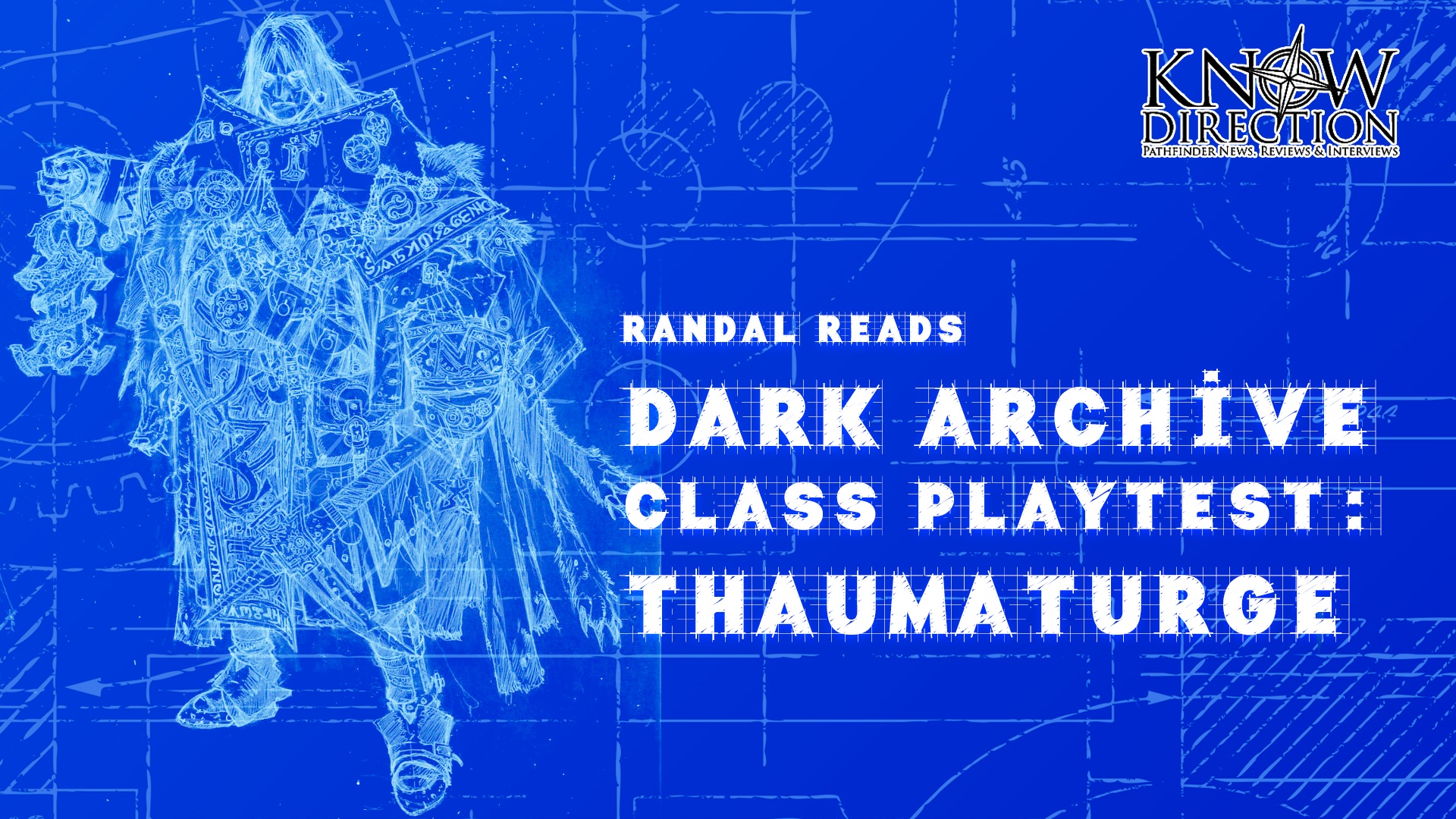Welcome back to the continuation of the Dark Archive (Playtest) special review blog! If you missed the beginning, you can find it here. Yesterday, we covered the psychic feats and today we do a deep dive into the Thaumaturge’s class features.
Thaumaturge
“The world is full of the unexplainable: magic, gods, and even stranger things. You scavenge the best parts of every magical tradition and folk practice to glean deeper laws of the universe, like the rule of three, the laws of symbolism, and the chains of sympathetic connections. You’ve built up a collection of esoterica—a broken holy relic here, a sprig of mistletoe there—that aid you in capitalizing on the weaknesses of any creature, and you carry a special implement whose symbolic function aids you in manipulating the world around you. Every path to power has its restrictions and costs, but you deftly turn them all to your advantage. You’re a thaumaturge, and you work wonders.”
This introduction sounds great. I am getting some Dresden vibes with a hint of Supernatural, and I am here for this. Let’s see if the content can bring to the table what my mind is already racing ahead to try and predict.
Unlike the Psychic, this class is not marked as Uncommon, which really piques my interest. I am guessing that hints that the rules found here are going to have less potential to imbalance a table? Or maybe that the class is more generally applicable to any campaign where the psychic can be heavily dependent on emotion and mental effects.
Class Features
You Key Ability is Charisma, which lines up with past rules choices that involve using, overusing, overpowering magic items. 8 HP + Con means you aren’t meant to be front line fighter, and at this early point in the reading I am thinking I might be better off comparing Thaumaturge to a Rogue. Perception (E), Fortitude (T), Reflex (T), Will (E). Perceptive, mindful, not overly physical. Trained in all 4 tradition skills (Arcana, Nature, Occultism, Religion) *and* 2 + Int mod more … this promises to be cover the bases of magic items! Trained in Simple, Martial, and Unarmed for attacks and Light, Medium, and Unarmored for defense shows that you will be able to kit yourself out with a lot of different options and variety.
Dubious Knowledge – A feat you get at 1st level just for joining the squad … this feat is fun and a perfect match for this class.
Esoterica
“You have a collection of esoterica; objects with symbolic significance; bits of various materials known for supernatural affinities; and items used in folk practices.”
It mentions you keep it in a bag or pouch, so I suspect it will be treated much like a spell component pouch.
Find Flaw – This 1 action ability can be used only once per round, and it is an upgraded Recall Knowledge (sort of). You make a Recall Knowledge as part of this action, and on Success (or Critical) you get more information than normal *and* you can use the Esoteric Antithesis action for free. On failure you get nothing new, but you can still use the Esoteric Antithesis action as your next action. On Critical Failure you become flat-footed due to a mistake and you cannot use Esoteric Antithesis this round.
Esoteric Antithesis – This 1 action ability allows you to grab an appropriate piece of your esoterica and apply if to yourself or weapons, which makes your Strikes count as magical against the target as well as counting as a damage type that the creature has a weakness to, even if you don’t do that type of damage. The rules for the weakness will likely take a couple of reads to fully grasp, but they are simple formulas that you should be able to write down once (changed when you level) and simply referenced.
This is rad. I mean, yeah. I still stand by my Dresden / Supernatural viewpoint.
Implement
Implements are items that you use to focus your thaumaturgy. You begin with one but eventually have three. Each type of implement has specific benefits or powers (I will go through them when I reach that section of the class). Additionally, you can use your implement in one hand to augment a Strike using a weapon in another. This starts as 2 damage, then increases to 4 at 3rd, 6 at 11th, and 8 at 19th level.
Level Up Improvements
Class Feats, Skill Feats, Skills, all “normal”
1st – I lied, you get a class feat at 1st level (and then every even level thereafter)
3rd – Fortitude to Expert
5th – Second Implement, Weapon to Expert
7th – Implement Adept, Will to Master, Weapon Specialization
9th – Reflexes to Expert, Thaumaturgic Expertise
11th – Armor to Expert, Perception to Master
13th – Will to Legendary, Weapon to Master
15th – Greater Weapon Specialization, Third Implement
17th – Implement Mastery, Thaumaturge Mastery
19th – Armor to Master, Unlimited Esoterica
Implement Adept
Gain the adept benefit of one of your implements. You can now switch implements in your hand as a free action Interact. It may seem small, but I think this free action will get a ton of use.
Thaumaturgic Expertise
Class DC to Expert, and an extra skill increase usable only for one of the magic tradition skills. I like this extra skill bump.
Implement Mastery
You may take the paragon benefit of your primary implement, or the adept benefit of one of your other implements. Having read through the implements further and come back to this, I really like the option to not take paragon but instead have two adepts. It won’t always happen, but the option to do so is pretty sweet.
Thaumaturge Mastery
Class DC to Master, and an extra skill increase usable only for one of the magic tradition skills. Again, the extra skill bump is a nice way to ensure they aren’t sacrificing other skills to maintain those needed for this class.
Unlimited Esoterica
You can use Find Flaws as a free action instead of using an action. This seems pretty solid and on point for a high level character of this theme.
Implements
The playtest includes only 5 implements, but states there will by 9 in the final version (“thrice three”). Each implement confers 3 benefits (surprise), an Initiate that you gain upon obtaining your implement, an Adept that you can possibly upgrade two items to (forsaking the next benefit), and a Paragon benefit that you can only get if you focus on a single implement (leaving your other two as Initiate level).
Amulet
Amulets are chosen as a focus for protection.
Initiate Benefit – You gain the Amulet’s Abeyance reaction that allows you you provide resistance against an attack from a creature you are using to benefit from Esoteric Antithesis.
Adept Benefit – Some of the resistance from your reaction lasts until the start of your next turn.
Paragon Benefit – You an allies within 15 ft gain the previous benefits.
As a reaction, I can see trying to use this ability quite a bit. Especially for somebody that looks to be in combat a lot but not automatically given other combat reactions like Shield Block or Attack of Opportunity. The wording of the resistances are more complicated than I made them out to be, but it should be easy enough to figure out after the first couple of times you use it. I approve.
Chalice
Chalices are chosen as a focus for health/healing.
Initiate Benefit – You gain the Drink from the Chalice action, usable once per round by you or an ally you administer. A Sip grants temporary HP while a Drain heals. It can be Drained only once every 10 minutes.
Adept Benefit – If you have taken piercing, slashing or bleed damage, your blood increases the healing benefits of the chalice.
Paragon Benefit – A Drain will reduce a number of conditions by 1, as well as attempt to counteract poisons, diseases, and curses.
I like the variable use of Sip vs Drain. That is a slick way of doubling the power of this implement without overcomplicating it. I don’t see a clear winner between these first two.
Lantern
Lanterns are used to expose secrets and illusions.
Initiate Benefit – You and allies gain a bonus to Perception within the bright light as well as a bonus to Recall Knowledge of a creature in the bright light. During Exploration you get free checks to find traps, hazards, haunts, secrets even if you aren’t Searching.
Adept Benefit – The lantern also reveals invisible and ethereal creatures.
Paragon Benefit – You lantern also gets free/secret counteract checks against illusions or transmutations to see their true form.
This is fun. There are lots of tropes about magical lights revealing things. Solid addition. I would be happy with these as my three, and I haven’t read the next two and don’t even know the last 4 (to round out the final 9 mentioned previously).
Wand
Lanterns are symbolically linked to the practice of magic.
Initiate Benefit – You gain the Fling Magic activity, 2 actions to damage a target within 80 feat (basic Reflex). The damage is 1d4 + Cha, increased 1d4 every odd level. Choose damage type when taking the wand (cold, electricity, fire)
Adept Benefit – Range increases to 120 ft, you can now choose from two damage types and each type has an added benefit if they fail (Speed penalty, persistent fire, flat-footed; respectively)
Paragon Benefit – Range to 180 ft, choice of all 3 elements, and single creature or 10 ft. burst.
This is great. It is a wand, but not a spell. More than a cantrip, basically 3 in one … but simpler. Just damage/effect. Not unlike Dresden (arguable, sure). I really hope the multiclass allows you to get an implement, I would love to see this wand option for other classes.
Weapon
Weapons represent the calm of the inner self. Just kidding. Hit things!
Initiate Benefit – Implement’s Interruption is basically an attack of opportunity against the subject of your Esoteric Antithesis. You also get critical specialization with this weapon at 5th level.
Adept Benefit – When you miss (not critically) with the reaction, you still deal 1 damage that also applies weaknesses.
Paragon Benefit – You reaction now disrupts on a hit instead of only on a critical.
This is nice to see, but frankly, I find the other options more interesting and fun. Sure, being able to hit things is great, and more options are best, and others will probably want to focus on this aspect. I can see it as a 2nd or 3rd option, but not as my primary. Perhaps that is just from me not feeling like the reactions and disruptions are gonna happen often enough. Maybe increasing bonuses to this Reaction as you increase your tier?
So far, this class is much more direct in layout and mechanics. It is closer to a fighter than I was expecting (I had kinda hoped it would be another skill hoarder). Perhaps on par with a ranger that has implements instead of hunter’s edge? That would take more analysis than I am prepared for at this point. Either way, the customization points are not “paths” but simply in which of the implements you decide to choose and which one you focus on. That ensures that the number of options and differences are huge, and assuming they are all equally balanced and/or interesting, we shouldn’t see the same combos repeated … and we don’t even know how the feat pool with alter that. But, that is going to have to wait until next time.
This takes care of the Thaumaturge’s class features. Tomorrow I will be doing a deep dive of the included class feats. As always, please join us at our Discord server https://discord.gg/Rt79BAj to let me know what you think or simply have a chat!




